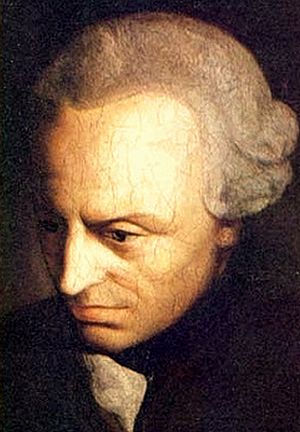Deontological ethics facts for kids
Deontological ethics is a type of ethics and ethical theories. It judges actions based on whether they follow certain rules. It is sometimes described as "duty" or "obligation" or "rule" -based ethics, because rules "bind you to your duty". The Ancient Greek word deon is commonly translated as obligation or duty. Deontological ethics is different from consequentialism, which judges actions based on what happens because of them. It is also different from pragmatic ethics.
There are different fields of deontological ethics. Some of them are:
- Immanuel Kant treated duty as very important. People call his ethics deontological ethics.
- Some people believe that some actions are morally right (or morally wrong), regardless of other things, for example their consequences or the intentions behind them. People call this idea moral absolutism.
- The term divine command theory is used for several ideas that say that an action is right if God says that it is right. William of Ockham, René Descartes and eighteenth-century Calvinists all believed this, according to Ralph Cudworth, because they all stated that moral obligations arise from God's commands.
See also
 In Spanish: Deontología (ética) para niños
In Spanish: Deontología (ética) para niños

All content from Kiddle encyclopedia articles (including the article images and facts) can be freely used under Attribution-ShareAlike license, unless stated otherwise. Cite this article:
Deontological ethics Facts for Kids. Kiddle Encyclopedia.

